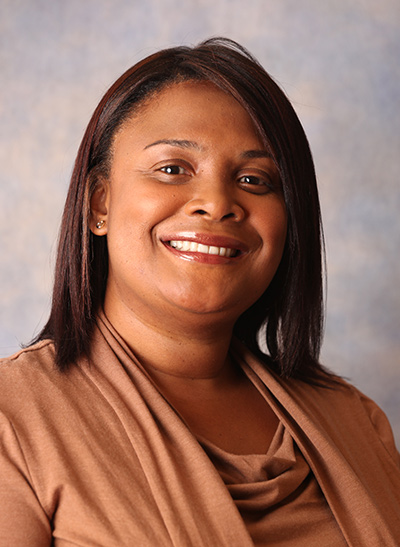Karlene Cousins is associate professor and chair of the Department of Information Systems and Business Analytics in the College of Business.
The department creates information systems specialists, who focus on developing technology solutions (e.g. databases, block chain, Internet of things), and who can apply and integrate those solutions with business processes to meet the information needs of a business. “We’re not creating programmers per se. We’re creating professionals who understand both information systems and business and can effectively apply information technology to drive business strategies and create profitability.”

Cousins is also the founding director of the ATOM Think Tank, a faculty consulting practice that provides experiential learning opportunities for students. “We have several faculty who are experts in areas like business analytics, information systems, block chain, artificial intelligence and business process design, and we were getting requests from industry members for help with specific issues at the same time that we were getting requests from students to provide them with more hands on experience,” says Cousins. ATOM solves real world problems for the business community at an affordable cost while simultaneously giving students real world skills so that they’re even more valuable once they graduate.
Cousins attended an all-girls boarding high school in her native Jamaica, where she was naturally talented in several academic areas. When IBM employees discussed computer science and information technology at a career talk, Cousins thought the field sounded like a good fit, as mathematics was one her favorite subjects.
Cousins, who also has a law degree, works at the intersection of law, business, and technology. A current research project is a study to determine preparedness of information technology in hospitals for pandemics, with the goal of coming up with a checklist for hospitals who aren’t prepared. She also teaches a wide array of classes with students at all levels. “There’s such a feeling of satisfaction when a student comes back to me and says that I taught in class really resonated, or when a student is inspired by my teaching of qualitative research methods to use that methodology in their projects.”
When Cousins was named chair of the department, she wasn’t excited as much as terrified, she admits. “It was totally unexpected and wasn’t in my immediate plan, but it was also an honor to know my colleagues entrusted our department to my care and oversight.” The department was handed over in a very healthy state of growth, so Cousins felt her goal should be to build its reputation as an intellectual powerhouse. She wanted faculty to want to work there and students to know their degree was prestigious. Over the past two years, Cousins has worked to integrate business analytics throughout the undergraduate curriculum, redesign the information systems masters program, and offer tracks in business analytics and cyber security. Both undergraduate and graduate enrollment has doubled, and for the first time, there’s a waiting list this fall.
Diversity is another important goal for Cousins. The department has a diversity committee, all faculty applicants have to submit a diversity statement, steps she feels any department in a university could take. The department regularly works with groups working towards increasing the number of minority PhDs in business, such as the Florida Education Fund or the PhD Project, to identify diverse candidates. “Few female faculty traditionally work in this field,” says Cousins, “but our committee has studied faculty and Ph.D. student diversity and has been very productive and successful. Around half of our faculty are women, which is very unusual.”
Cousins credits her predecessor, who also made it a priority to hire women, for her work in creating a department that was already bucking the trend, and is dedicated to maintaining and growing that legacy. “I want our departmental environment to be collegial and positive, and known for service excellence to faculty and students alike. If you support faculty and they excel, that drives student success.”
